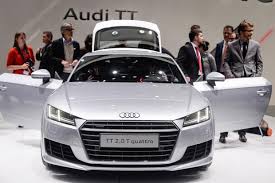Following a year that was impacted by the diesel crisis, Audi plans to continue pushing forward with its strategic transformation. At the Annual General Meeting in Neckarsulm, the Board of Management explained the company’s plans for its models, technologies and business operations to the shareholders.
The company explained that in the first quarter of 2017, the Audi Group achieved an operating profit of more than €1.2 billion.
According to the company, with an operating return on sales of 8.7 percent, the company clearly met its profitability target. The net cash flow increased to more than €1.5 billion.
“We are rejuvenating our model portfolio enormously and will renew five existing core model series by mid-2018,” stated Rupert Stadler, Chairman of the Board of Management of AUDI AG. “In addition, we will expand our successful Q family by 2019 with two new concepts – the Audi Q8 and the Audi Q4 – and we will launch our battery-electric e-tron models.” Audi plans to launch three new electric models by 2020, after which the brand will gradually electrify models in each of its core series.
The focus this year is on top-end models with the new generations of the Audi A8 and Audi A7. The premium manufacturer will unveil the A8 at the first Audi Summit to be held in Barcelona on July 11. With this new event concept, the Ingolstadt-based company will create an exclusive presentation format all around the Four Rings. “There, we will show the world everything that defines Vorsprung durch Technik and our brand,” explained Stadler.
Audi is systematically utilizing Group synergies in order to implement topics of the future even faster and more efficiently. In April, the brand agreed on new development cooperation with Porsche for future vehicle architectures. This will result in potential cost savings across the brands in a three-digit million amount each year. Part of the cooperation is the development of shared premium architecture for electrification – an effective lever to enhance the competitiveness of electric cars. By 2025, Audi intends to achieve a proportion of one third fully or partially electric models in its unit sales.
In addition to the traditional car business, the premium brand will expand its range of digital services in the future. With myAudi, the company aims to create a consistent entry into the brand’s digital world and establish a platform for a wide range of online services, which will be open also for third-party providers to offer services. Audi is also expanding its mobility services for urban areas and intends to offer them in more than 15 markets worldwide by the end of this decade.
With a subsidiary founded in March 2017, Audi will take over the leading role within the Volkswagen Group in the development of autonomous driving. Autonomous Intelligent Driving GmbH is working on the technology for driverless vehicles in urban environments, which will be applicable in models of various brands. The technology is to be ready for application in a first small series of cars early in the next decade.
“We are financing our transformation out of our own resources,” said Axel Strotbek, Member of the Board of Management of AUDI AG for Finance, IT and Integrity. “Our business operations are robust also in the currently challenging situation. On the side of expenditure and investment, our ‘Speed up!’ program is helping us to achieve a high level of efficiency and thus a maximum focus on the topics of the future.”
In full-year 2017, the company intends to slightly increase deliveries of Audi-brand cars compared with the number of 1,867,738 automobiles delivered in 2016. Revenue should also slightly surpass the prior-year level of €59.3 billion. In terms of operating return on sales, following the 5.1 percent of last year, Audi now plans to achieve its strategic target corridor of 8 to 10 percent once again. In 2016, operating profit was reduced by €1.8 billion and operating return on sales by 3.1 percentage points due to special items in connection with the diesel crisis and Takata airbags

